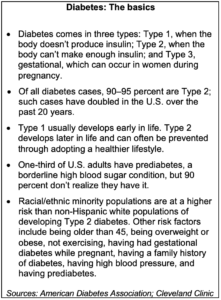It’s been called the silent epidemic: Diabetes afflicts more than 10 percent of Americans, with the numbers growing exponentially. Simply stated, it’s a condition in which the body does not make enough insulin—a hormone that removes sugar from the blood and puts it to work as energy. High blood sugar over time can lead to heart disease, kidney failure, vision loss, and other serious health problems, each year claiming 4.2 million lives around the world and ranking as the seventh-leading cause of death in the U.S.
 Addressing the challenge in senior communities
Addressing the challenge in senior communities
The risk of developing diabetes increases with age. According to the American Diabetes Association, nearly 27percent of adults over age 65 are living with the disease.
“While diabetes can present serious problems for adults of all ages, seniors are at particularly high risk from diabetic complications because the body’s ability to heal wanes with age,” says Callie Whitwell, chief operating officer and founding partner at Lifetime Wellness. Her company provides whole-person wellness programs with a customized approach for senior living communities.
Also, Whitwell notes, such age-related conditions as impaired vision, loss of skin elasticity, and reduced mobility can work against effective disease management.
Managing and maintaining
Leading senior living communities are making a dedicated effort to educate and support senior residents who are living with diabetes, providing patient education and guidance in self-management to improve residents’ quality of life.
Lifetime Wellness, for example, offers its partner communities a LifeWorks program dedicated to whole-person wellness programming. It includes resources and tools that support residents in managing their health and making better lifestyle choices.
Whitwell offers these tips for seniors in managing their diabetes:
- Stay educated. Look to your health care provider and support team for guidance in disease management and steps to prevent diabetic complications.
- Eat well. A healthy diet is essential in the day-to-day management of diabetes. Be mindful of food intake. Choose foods that are low in fat and sugar and naturally rich in nutrients, with a focus on fruits, vegetables, and whole grains.
- Move it. Stay physically active to lower blood sugar levels. Exercise for at least 30 minutes a day, five days a week.
- Monitor your blood sugar. Check your blood sugar levels on your own or through your caregivers.
- Take your medication. Missing medications prescribed by your doctor can upset your blood sugar levels. Take your medications on schedule each day, as your doctor prescribes
- Get vaccinated. Seniors are more susceptible to the flu and other illness and also have a longer road to recovery from these illnesses. Get regular vaccinations recommended by your health team.
- Reduce stress. High stress levels can cause spikes in blood sugar. Find ways to reduce stress, from practicing Tai Chi to spending time in nature.
Seeking the cure
To contribute to raising funds for diabetes research in the search for a cure, Lifetime Wellness is joining groups around the globe in sponsoring a virtual run/walk through November.
“Participants can sign up individually or as a team, selecting from a 1k, 5k, 10k, or half marathon,” Whitwell says. “They can complete the event at their convenience, running or walking at their own pace, and in their own time. Results can be shared on social media with the hashtag, #LTWrunfordiabetes. Along with spreading awareness about the importance of diabetes prevention and treatment, it’s a great way to remind us all to take better care of ourselves.”
To participate, sign up through this link and select team “Lifetime Wellness” for $5 off.
“I call upon all Americans, school systems, government agencies, nonprofit organizations, health care providers, research institutions, and other interested groups to join in activities that raise diabetes awareness and help prevent, treat, and manage the disease.”
President Joseph R. Biden, Jr.